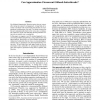Free Online Productivity Tools
i2Speak
i2Symbol
i2OCR
iTex2Img
iWeb2Print
iWeb2Shot
i2Type
iPdf2Split
iPdf2Merge
i2Bopomofo
i2Arabic
i2Style
i2Image
i2PDF
iLatex2Rtf
Sci2ools
AAAI
2010
2010
Can Approximation Circumvent Gibbard-Satterthwaite?
The Gibbard-Satterthwaite Theorem asserts that any reasonable voting rule cannot be strategyproof. A large body of research in AI deals with circumventing this theorem via computational considerations; the goal is to design voting rules that are computationally hard, in the worst-case, to manipulate. However, recent work indicates that the prominent voting rules are usually easy to manipulate. In this paper, we suggest a new CS-oriented approach to circumventing Gibbard-Satterthwaite, using randomization and approximation. Specifically, we wish to design strategyproof randomized voting rules that are close, in a standard approximation sense, to prominent score-based (deterministic) voting rules. We give tight lower and upper bounds on the approximation ratio achievable via strategyproof randomized rules with respect to positional scoring rules, Copeland, and Maximin.
| Added | 29 Oct 2010 |
| Updated | 29 Oct 2010 |
| Type | Conference |
| Year | 2010 |
| Where | AAAI |
| Authors | Ariel D. Procaccia |
Comments (0)

